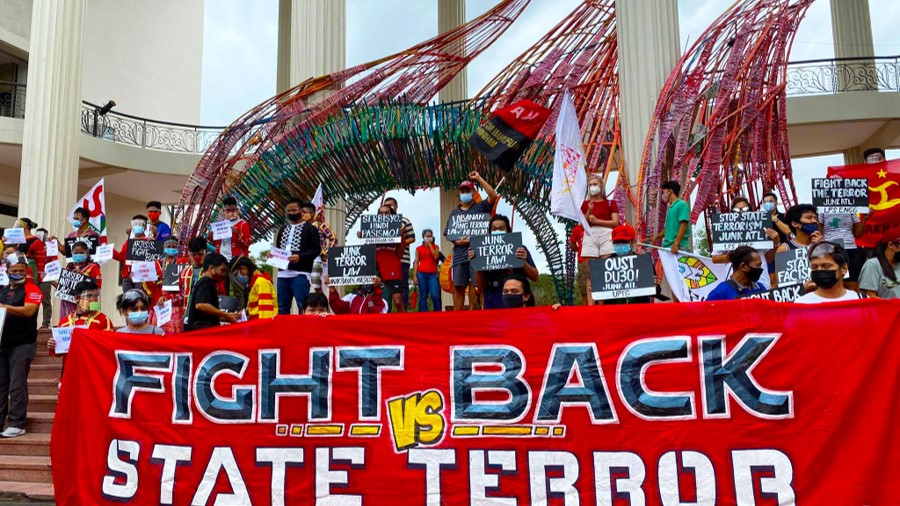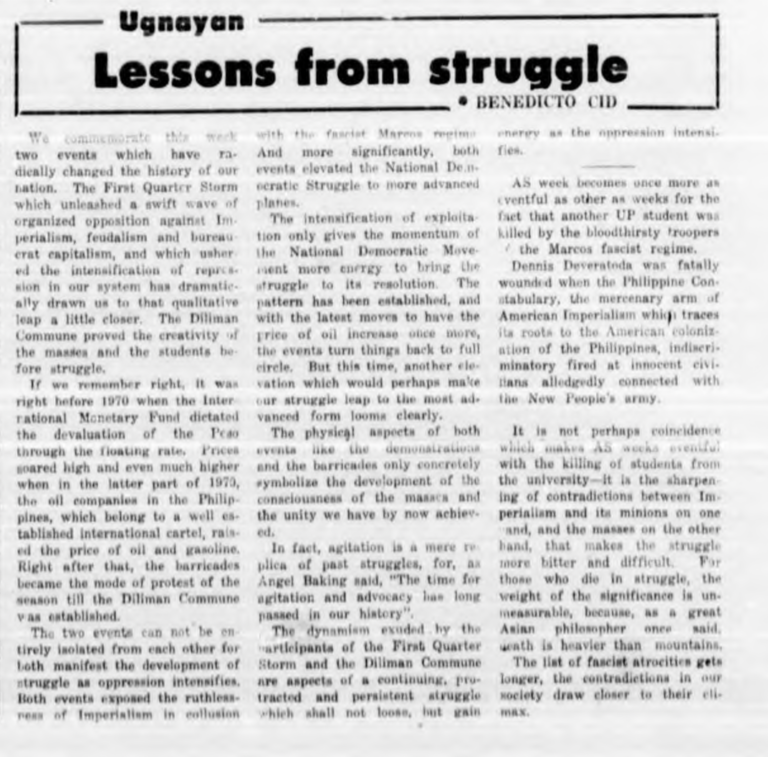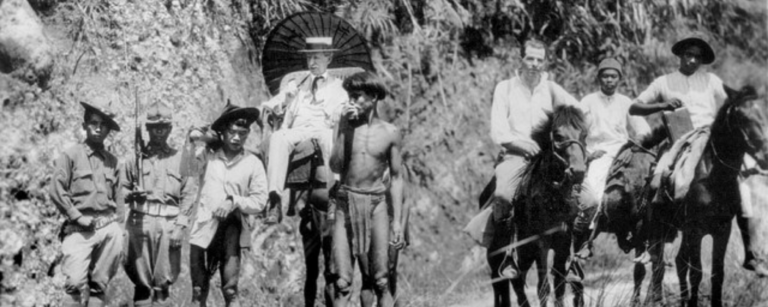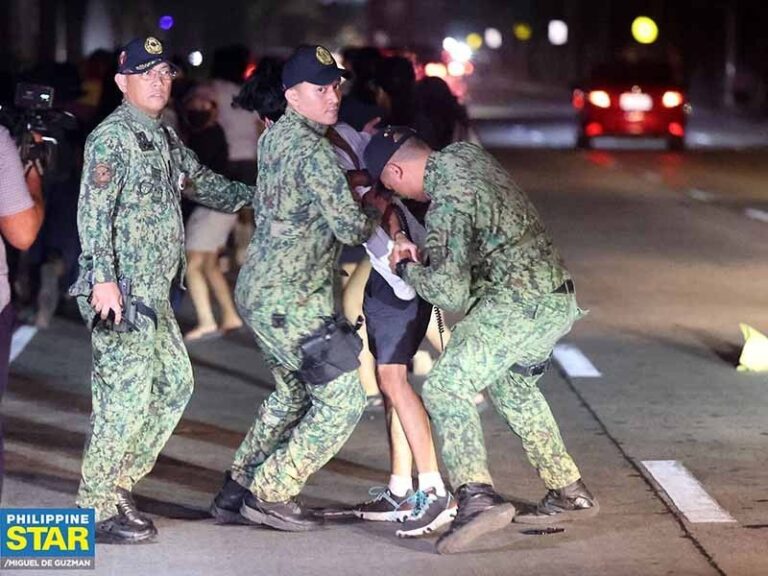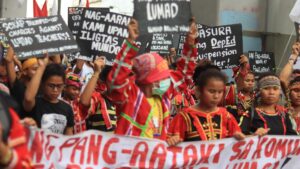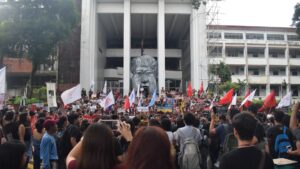
It was the hands of President Duterte that signed both Executive Order No. 70— institutionalizing the National Task Force to End Local Communist Armed Conflict (NTF-ELCAC)—and the Anti-Terrorism Act of 2020. It was also the same hands that, among his virtual junta and the public sphere, have pointed to the so-called “enemies of the state:” communists.
But first, we must identify how communism is defined by the state, particularly Duterte’s regime. The term communist has often been deployed — ranging from state-sponsored trolls, official red-taggers of the regime, and Duterte himself — to tag government critics, actual communist or not. We have seen how the shift from the war on drugs to the war on “communists” has been a damage control of the abject crimes against humanity that Duterte committed. For his populist authoritarianism, with its contradiction with the revolution’s motive forces, is bound to face greater resistance. The overthrow of the US-Marcos dictatorship serves as evidence of this historical fact.
As a result of desperation to survive, the official anti-communist state policy is to kill actual communist revolutionaries or kill civilians and activists then brand them as communists after. Hence, for the Duterte administration, a communist is someone to be killed or persecuted. From the NTF-ELCAC’s black propaganda to Duterte’s countless “shoot the NPA/Left” remarks. What this proves in the end is that any semblance of democracy in our country has been removed except for its facade of democratic institutions and processes. Therefore, it is a dictatorship.
TRAITOR TO THE PEACE PROCESS
The recent victims of his anti-communist witchhunt are peace negotiators and consultants for the National Democratic Front of the Philippines (NDFP). In a Resolution No. 17 by the Anti-Terrorism Council, 13 members of the NDFP peace panel were listed as “terroritsts” — including its chief political consultant Jose Maria Sison and his wife Julieta de Lima. The proscription was based on the intelligence sector’s claim that the 133 are part of the Communist Party of the Philippines Central Committee or the CPP’s top leadership. They denied ATC’s allegation and called Duterte and his generals as the real terrorists.
In 2016, the Government of the Philippines and the NDFP resumed peace negotiations to tackle their very contrasting models of socio-economic reforms. The peace talks were productive. However, in 2017, Duterte pivoted his relationship with the revolutionary movement by ending the peace talks; possibly, in an attempt to please the US for more military aid. Simply put, it was Duterte who ended opportunities for both parties to the armed conflict to discuss diplomatic ways to resolve the structural and historical inequalities of the current social order.
Duterte did not stop at terminating the talks. A series of arrests and killings were made against NDFP peace consultants afterwards. Randy Malayao was killed. Consultants Wilma and Benito Tiamzon, Raffy Baylosis, Vic Ladlad, Adel Silva, Rey Casambre, and Estelita Suaybaguio were arrested based on trumped-up charges. Consciously, the Philippine state violated its agreements with the NDFP — the Comprehensive Agreement for the Respect of Human Rights and International Humanitarian Law (CARHRIHL) and the Joint Agreement on Security and Immunity Guarantee (JASIG). The proscription solidifies an obvious political statement by Duterte that he is not genuinely interested in just and lasting peace by resolving the harsh roots of armed conflict—52 years and counting.
As a full-blown reaction, State terrorism was not only confined with known leaders of the revolutionary movement. In 2018, Duterte instituted the “whole-of-nation approach” which created the NTF-ELCAC. Military and police operations resulting in massacres carried out the said approach and its dry run, Memorandum Order No. 32, focusing on areas with high concentrations of the New People’s Army (NPA). Arrests and killings among the legal mass movement became rampant too (e.g. Bloody Sunday and Negros killing fields). With the rise of social media and fake news, red-tagging also became a consistent state weapon in the war of positions along with the war of maneuver.
Come pandemic, two trends have continued. First, there is no possibility for the peace talks to continue. Second, the anti-communist purges intensify. The militarization of the pandemic response means that Duterte’s fascist-mongering is a pathological need born out of his bloodlust from the days of Alsa Masa, Davao Death Squad, and Oplan Tokhang. A provincial mayor turned mass murderer in the national sphere is clearly a class enemy. The dominance of the opposition-purging over the resumption of peace talks is Duterte’s politics — anti-rationalism, fascism, genocide, and counter-revolution.
HISTORICAL ROLE OF THE UNIVERSITY
The student movement of the Long Sixties has become powerful for three reasons. First, it was a participant in an array of anti-imperialist student protests worldwide. Second, it was antithetical to the worsening economic crisis cum state fascism. Third, the students learned from the masses; some even offered their lives to wage the revolution in the countryside. These three factors support a radical, more so necessary, position that the neoliberal universities of today should be transformed into sites of, whatever you want to call it, rebellion, resistance, revolution against a violent regime that desecrated its academic freedom, its foundations, in a bid to legitimize itself.
Ouster Matrix, Red October Plot, “NPA breeding grounds,” and even university students who became NPA martyrs were presented by the state as evidence of “communist recruitment”. But any thinking individual would easily debunk these dumbfounded allegations. As critical students, it is our duty to transcend the current discourse on red-tagging by studying the fundamental ills of the society: the neocolonial state, monopoly of the landed elite, and a government run as a corporation of the ruling class. No amount of red-tagging, nay terrorist-tagging, can erase these historico-material realities manifested in the worsening crisis in the Philippines.
We study Marx, Lenin, Mao, Fanon, Said, Guillermo, Constantino, Sison and other radical thinkers because they offer valuable lessons to the struggle for national liberation and democracy. This is academic freedom that permits the university to be a social critic, to delink from the state ideology, and to resist all forms of violence, armed or structural, caused by the system. Education should be a liberating experience. And beyond the four walls of the computer screen, the “real world” offers valuable lessons that tests our courage, imagination, and selflessness. It is thus a challenge, but more of an imperative, for the university student to struggle with the masses towards final victory. Outside our classrooms, in the streets, we see what our bourgeois education has deprived us.
For the longest time, the University, and its academic freedom, has been packaged by its being a “marketplace of ideas.” With the introduction of neoliberal reforms in education, further individualizing education and taming the university’s freedom by the invisible hand of the free market, we have seen how the student movement struggled, in both senses of the term. The three reasons why the student movement of the Sixties emerged victorious find parallels to today’s context and it is our task to decide if we will devote ourselves to exploit the appropriate objective conditions of crisis and resistance.
The only way to fight Duterte’s anti-communist witchhunt is to go beyond the marketplace of ideas divorced from the necessities of the larger society. We must embrace the university as a social critic — or as the maxim says, demand the impossible in order to be realistic (read: revolution). Let the militant struggle of the masses be our persevering teacher and test. For as long as the university is threatened by fascism’s guns, academic freedom must be used to liberate others.
In the end, as Duterte’s anti-communist witchhunt tries its best to creep into UP, we should always remember: it is not us who killed thousands of people. We are not terrorists, as the state claims. It is Duterte. He should be the one to be hunted and brought to the mercy of our anti-fascism.

